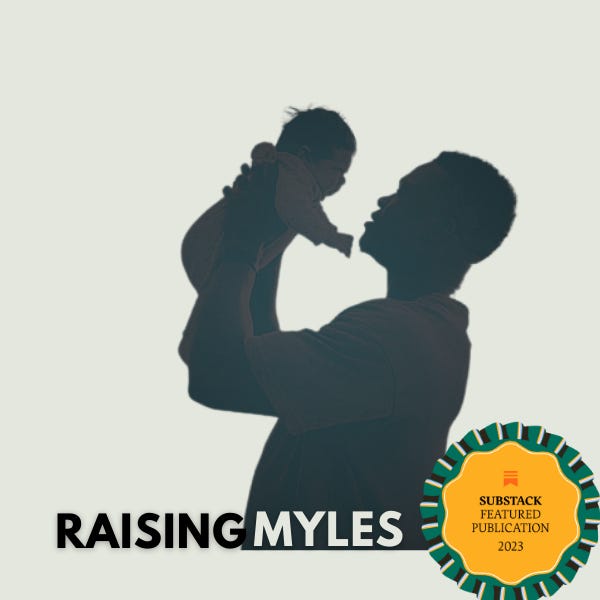
Inspired by Ta-Nehisi Coates’ “Between the World and Me”, is a first time dad writing letters to his newborn son every Monday, sharing the joy and love he didn't experience himself with the world. His publication is Raising Myles.
1. Why Substack?
I was going through some pre-birth daddy depression while my wife was pregnant. To process all the feelings coming up, I started journaling my thoughts and addressed these letters to my son in an email account I created for him, intending to give it to him when he was older. But I started to wonder, what if I could share my experiences with the world in the meantime, because I couldn't be the only one feeling this way? To be honest, I felt desperately alone.
I reached out to my best friend
, who had a newsletter on Substack, to share my idea of writing letters publicly about my journey of being a dad and the love I never fully experienced when I was younger. She suggested I try Substack. I enjoy the ease of writing on the platform and using the various tools it offers, whether it’s creating a video, sharing a voice note, or simply doing what I think I do best—showing up and writing about how much I love my son and his mother.2. How long did it take you to find your groove?
I don’t know how I did it, but somehow I managed to post a letter on Substack every week since my son was born. I’ve been writing with the same love since his first weeks of life as I do now. People often talk about rest and not wanting their writing or other passions to feel like labor, but writing these letters every week has been a form of therapy for me. It’s been super hard, but I am an all-or-nothing person.
Writing weekly allows me to express what’s on my heart, click publish, and move on. Because of the deadline I’ve set for myself, I don’t have the time to get too attached to the letters. I’m not interested in producing perfect pieces, but in writing as many letters as I can, so when he reads them, he has an idea of how much I love him. Having so many eyes on these letters provides a gentle pressure to keep showing up. Truthfully, if it weren’t for the love and compassion of so many people receiving these letters, I probably would have stopped a long time ago.
3. How has it changed you?
I’ve always written. I used to love performing spoken word. In fact, in high school, I even had a blog with some friends called Seventy Seven Strangers (I was Pete Strangers). 77 Strangers was where we all just showed up and posted what was on our hearts. Sometimes I wonder where it would be now if we had kept it going.
But even after all that writing, I never called myself a writer until I started writing on Substack. Something about calling myself a writer always felt uncomfortable, as if claiming that title would somehow take away my ability to write. I remember one day reading a post from
called You Can Be Everything You Want to Be, and that night I said the words out loud. As I stepped into my identity as a writer, not only did my ability to write not disappear, but I also began introducing myself to others as a writer.I’ve learned that what I want is on the other side of fear, and that when I feel uncomfortable, that’s where the growth happens. Writing these letters has taught me to quiet the voice that tries to tell me I need to dim my light to be valued. When I show up, I give others permission to do the same.
4. What mistakes have you made?
I am an open book. I believe that the things that happen to us are meant to be shared because none of our experiences are unique. They serve as a testimony or a reminder that we are not alone, and there are others out there on God’s beautiful planet who have been through similar struggles and are already on the other side. That’s how I see them through my rose-colored spectacles.
However, not everyone shares that perspective. Being vulnerable and honest comes with its challenges. Early on, I had to unpublish a letter I posted when I was feeling alone and deserted. In that letter, I unintentionally hurt my family members and my wife. While it wasn’t my intention, intention doesn’t matter when you hurt people.
I’ve learned that not everything needs to be shared in these letters for the world to see; some letters can go directly to his email, just for him. I’m grateful to have learned this lesson when I had only 300 subscribers and not 3,000. When I have doubts about clicking the publish button, I run it by my chief editor of staff—my wife.
5. To pay or not to pay?
I have the kind of school debt that isn’t going anywhere anytime soon—the kind you don’t think about, just budget for, and keep going. But I don’t want that for my son. In the beginning, I didn’t turn on the paid option. I asked myself, what would people be paying for? However, after a while, I realized people want to pour into me. And what better way for them to do that than by supporting my family? Every dollar I collect from Raising Myles goes toward my college plan for him. I am trying to build something generational for our family—something that can be passed down to him and his children, and also so he doesn’t have to worry about college expenses. Although I haven’t collected a lot, a little goes a long way.
The decision to go paid or not to go paid is the Substack question every writer faces. After having a conversation with a good friend
, who I admire so much, I realized that not only am I good enough, but this is a decision everyone has to face. Side note: it’s important to keep good company—people who see your light when you’re in the dark. Thank you, Caroline, , Rachel, , and . These women and what they have written and shared with me remind me constantly that what I have is worth sharing and that people want to receive it. It’s up to me to create opportunities for others to support me. So I turned on the paid option, and if people want to contribute, they can. If they don’t, that’s okay too. I’ll be writing regardless.6. What artistic and technical choices have you made
Every letter starts and ends the same way: “Dear Myles,” and concludes with “Love, Daddy.” I keep this as the template because it helps me stay focused and grounded; this is where I started and what brought me to do this in the first place. These letters are for him, to show him I love him just in case I am not around to tell him myself.
While this structure keeps me grounded, it’s been hard to collaborate with people I admire so much. I don’t want to stray from my original purpose, but I also enjoy working with others. I’ve decided to put really personal letters about my upbringing, and what it means for me to be raising a Black son behind a paywall – I call these letters Going Deeper. When I want to cook with the fat of my reality, I put those letters behind the paywall. I have a family to feed, and I don’t want to risk losing my job or harming myself or my family because I decided to be a little too honest.
These letters are a bit deeper and more honest, but they still don’t reveal or parade any of my personal trauma. Recently, I’ve also placed a paywall around my old letters. Some of my readers have convinced me that I should turn these letters into a book—maybe I am crazy, but I believe them.
7. What’s been the effect on your writing?
Since I started writing on Substack, I have become a more confident writer. Because I write for myself and have the freedom to do so, I can explore topics that I love, make me laugh, or make me sad, all in my own way. After a year of writing these letters, I realize I do not need to write a certain way to appeal to anyone—my writing is enough, I am enough.
8. In it for the long haul?
I hope to write these letters as long as I can, at least until Myles can read them himself. I am looking forward to the day he can write me back. Until then, I will keep writing them for the people who want to read them. It baffles me that I created something people look forward to reading every week. This little Black boy, who didn’t even know how to dream, now has words reaching people in all 50 states and 95 countries. My words have landed in places my feet have yet to step in—and there is something so beautiful about that. That alone provides the gentle pressure to keep writing to him. Plus, college is not cheap. My wife went to school on a full scholarship; I was not so fortunate. Just in case Myles needs a little help, what I earn from these letters, hopefully, can make a difference.
Subscribe to :





